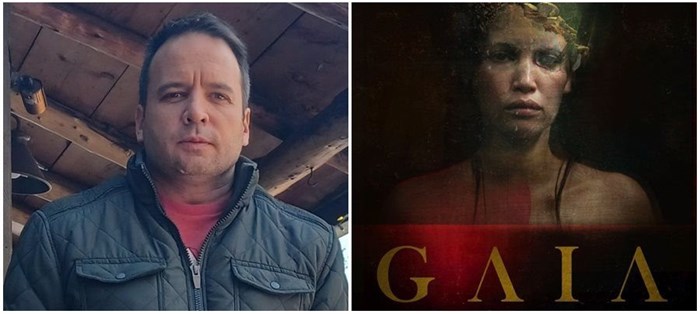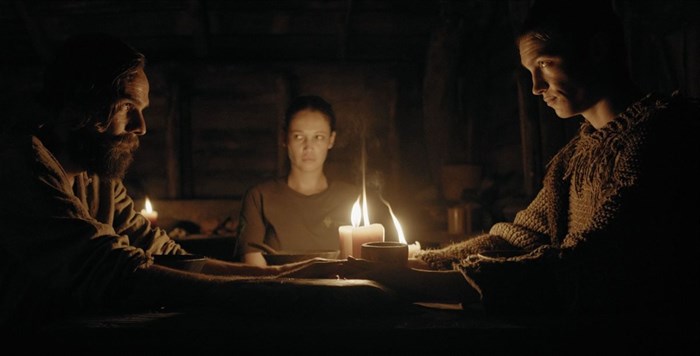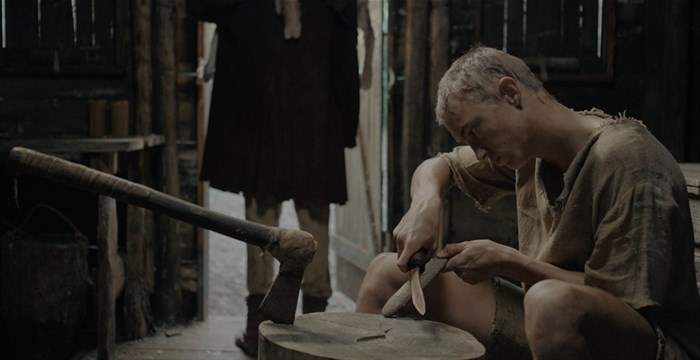






He now takes us on a mind-blowing journey with the ecological horror fantasy Gaia which was named Best Horror Movies of 2021 by Variety. It also received the Asteroide Award for Best Film at the Trieste Science+Fction Festival, Italy in 2021 and Best Feature Film at the Silwerskerm Film Festival in 2022.
I caught up with him to find out more about the creative process of Gaia...
I wouldn’t say there was a single moment.
There was a lot of research into discoveries in mycology (the study of fungi), plant biology, psychedelics and ritual, all of which contributed to building the world of Gaia. I was fascinated by the communication in the fungal network, which resembles a form of intelligence, almost alien, but right here on earth.
The ecological theme actually entered a bit later in the development process. Both Jaco and I really liked the Abrahamic story of Isaac and the Binding, and we knew that we wanted to work with this claustrophobic fear of living with one other human being, who is probably insane. It feels as if that actually announced itself as a metaphor for the ecological crisis, the notion of sacrificing the next generation for the blind faith of the current one.

I had been working with the idea of a hermit, a recluse, who had a singular devotion to a cause, to the point that it becomes a psychosis. From a literary point of view, I have a perverse fascination with manifestos, like the Unabomber one. It’s a bit like finding Jack Torrance’s written pages in The Shining: real-world horror scripts, giving us a glance into the worldview of the mad.
And then I had the idea: what if this character (Barend) simply knew that God lives in the forest, and was speaking to him, albeit in a voice we couldn’t understand?
Science is bringing us information our minds can’t comprehend, with increasing frequency. I admit I have a bit of a thing for time on the mega-scale, the long before, the long after. There are these analogies like if the universe were a day, humans came about four seconds before midnight. I have some background in archaeology, which has always fed into these perspectives.
And yet it appears to us that all of history was building up to us, it’s a crowning achievement, which is obviously anthropocentric. In the case of Gaia, the idea developed: what if human history – all of this progress, of building and inventing, colonizing the entire planet – what if, in the end, it served only as a stage in the reproductive cycle of another organism? What if we’re just the dispersal mechanism?
The sombre tone of ‘the flowers at the end of the Anthropocene’ is quite cheeky, but it feeds into an interesting space of ritual. I do think we carry this guilt for the harm we are causing to earth, and subconsciously, some people crave absolution.
Thank you very much. I think we wanted to push the characters to their limits, in terms of their understanding of the world and their place in it. We worked with body horror, ideas of invisible contagion that could already be inside of you before you know it, transgressing the boundary of the skin. That raised the stakes of the conflict too – if it takes me, it can take everyone.
We could have a character picking off a small fungus that had been growing on her arm, but that carries huge stakes, both to herself and the world. After seeing the end product of the infection, the Apostle monsters, the smallest itch becomes terrifying.
And then suddenly a global pandemic struck and that is what we were all feeling!
It’s a bit of a balancing act. You find yourself trading off mystery for suspense or action, and there are many unpredictable factors that determine which one will pull you through.
With Gaia, we knew we were building up to that violent ending, and wanted to explore other sensations along the way. The world had a lot to show, teasing out revelations, desires and rituals. By the time we reach the climax, it has hopefully acquired its full significance.

It has, although Griekwastad was probably one of the first films to premiere exclusively on home viewing, and did quite well for it.
Even before this, any local film was up against superheroes from two universes at the theatres and usually did quite poorly. I mean, I love the theatre, but I’m bored with explosions. Thank God for the Labia which brings us great films on a big screen.
On the other hand, a more distributed model (home viewing) does allow you to find your niche audience, without having to bring them together in a room for the money to make sense. Perhaps the loss is felt more strongly in places like the US, where indie film theatres and the cinema experience are a much bigger thing.
I’m working on several projects, but it’s pre-emptive to name anything, as the majority of scripts one writes never get made.
There’s a lot of bullshit to navigate in the film industry. Even after the success – commercial and artistic – of Gaia, it’s tough to get a new project off the ground, to convince financiers and buyers of your vision. We are so grateful for someone like Jan du Plessis at M-net, who shared the Gaia vision from the start.
So, let’s just say I have something that shares some chromosomes with Gaia, without it being a sequel. I’m also working on an arthouse action film and starting a TV series next month. I can’t share titles yet, as they are all works-in-progress!
Gaia is available to watch on DStv Box Office.
Read the full interview and more about South African films and filmmaking here.
